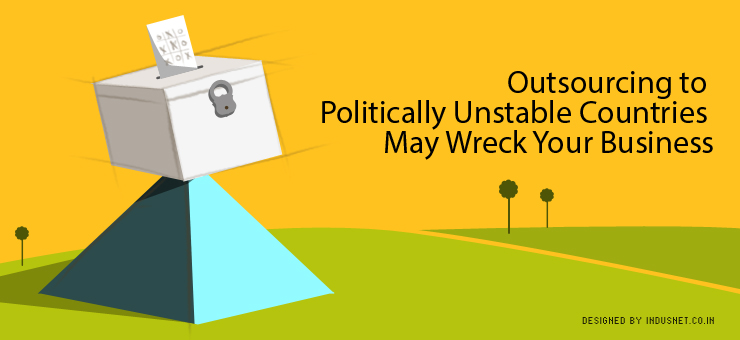
Outsourcing has become an integral part of doing business and most enterprises engage in some kind of outsourcing, either onshore or offshore. What started as a movement restricted to certain IT companies during the early 1990s has now become an accepted way of doing business. Outsourcing as a practice has helped companies to become leaner and more efficient, thereby allowing them to concentrate on their competencies.
India, the Philippines, South Africa and China to an extent have been the largest outsourcing destinations for companies in the U.S.A. and U.K. In the last few years, countries like Bulgaria, the former Yugoslavian states of Serbia, Bosnia and Croatia, Romania and even Ukraine have begun to become popular as outsourcing destinations.
However, all countries are not the same. Some countries have better infrastructure and are closer in culture to the USA or UK than others. Others suffer from political instability and economic difficulties. Before outsourcing, you need to ensure that the country is not going through major economic or political upheavals.
In this article, let us take a look at why it is a bad idea to outsource to politically unstable countries.
1. Risk of policy changes
Most politically unstable countries often have shifty policies that are not consistent with a long term business and investment strategy. Thus, if you end up investing when you think it is favorable, your outsourcing business may suffer when the government changes. Sometimes, governments change within months. Make sure you do not invest in a country here governments fall and rise within a short period of time. It may seem like a vibrant democracy but if the governing bodies are not consistent, your investment projects may suffer.
2. Risk of unforeseen non-working days
Politically unstable countries also have a high rate of labor strikes and even curfews. Such situations may lead to non-working days and the loss of precious man-hours. When you outsource your project to a country, you expect that your tasks get completed on time. If the employees in your outsourced team do not turn up to work because of strikes and curfews, you will not only end up with a delayed project but also a loss of money and effort.
3. Security risks
Countries that are unstable often have security risks. This may affect you in a number of ways. If your data is compromised, you may not have readily available IT regulations on which you can rely. When there are real security threats, you may not even be able to find legal recourse and that may cost you more than you intended to save with the help of outsourcing.
4. Risk for infrastructure
Politically unstable countries are often prone to demonstrations, riots and violent protests. If you have the bad luck of having an office right next to a violent demonstration, there are chances of damages to your physical infrastructure. Somebody throwing stones at your glass windows is enough to cost a significant amount of money for repairs. While all this may seem far-fetched, such damages do occur in unstable countries that are prone to protests and violent demonstrations.
5. Unfavorable business atmosphere
Some countries, though peaceful, may have an unfavorable business atmosphere. This has got more to do with the political and economic policies of a country rather than any form of instability. If you continue to see business-unfriendly governments rule a country repeatedly, you can take that as a sign of being investor-unfriendly. Your projects may get stuck in red tape, you may have to spend unnecessary time waiting for approvals and worse, you may encounter corrupt officials.
Final thoughts
However tempting it may seem to invest or outsource to a country just because everyone else is doing it or because the brochures are attractive, think carefully. Make sure that you outsource to countries that have traditionally been long term players in offshore industry. Those countries include India, the Philippines, South Africa, Brazil and certain Eastern European countries like Bulgaria and Croatia.
Speak to a consultant and discuss which countries are best for your particular business and what risks you may encounter in that particular country. Take decisions only when you are convinced about the lack of risks.